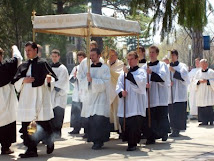The author takes an extraordinary “leap” in the beginning of this article where he states: “Expressions such as ‘revelation,’ ‘Word of God,’ and ‘God speaks’ are becoming increasingly more difficult to use…something superfluous, even foreign” (Schoonenberg, 1984, 303). How ironic that statement truly is within today’s mindset of “morally correctness” and within the society’s “tolerant” level for what is considered to be modern morality.
This particular paper emphasizes the rational of the Catechesis within the aspect of “revelation and experience.” The author utilizes very clear and concise ideology within the framework of catechesis. Revelation is important because it is presented as disclosure of a secret or a mystery hidden in God, transcended through humans (prophets). Experience is important because of our time not only is Christian but also this must experience must be converted and saved and allowed to grow more Christian (Schoonenberg, 1984, 310).
It would almost appear that the modern mindset of today’s society is nothing less then a “numbing” sensation towards God. We, collectively as a society, numb ourselves towards the goodness and embrace the “evilness” or those tendencies that are less than desirable for the betterment of society. God speaking to us to correct “our” ways seems very superfluous and foreign. The Christian message, the message of God, has become empty of meaning within our society and within today’s secularization.
We tend not to depend or deepen our revelation of God and unfortunately for us, our experience becomes hampered by the “modern status-quo” of modern society; instead of deepening our faith. No amount of catechesis will change our experience unless we become “open” to the revelation and experience.
Christian Education
"Since all Christians have become by rebirth of water and the Holy Spirit a new creature(8) so that they should be called and should be children of God, they have a right to a Christian education. A Christian education does not merely strive for the maturing of a human person as just now described, but has as its principal purpose this goal: that the baptized, while they are gradually introduced the knowledge of the mystery of salvation, become ever more aware of the gift of Faith they have received, and that they learn in addition how to worship God the Father in spirit and truth (cf. John 4:23) especially in liturgical action, and be conformed in their personal lives according to the new man created in justice and holiness of truth (Eph. 4:22-24); also that they develop into perfect manhood, to the mature measure of the fullness of Christ (cf. Eph. 4:13) and strive for the growth of the Mystical Body; moreover, that aware of their calling, they learn not only how to bear witness to the hope that is in them (cf. Peter 3:15) but also how to help in the Christian formation of the world that takes place when natural powers viewed in the full consideration of man redeemed by Christ contribute to the good of the whole society.(9) Wherefore this sacred synod recalls to pastors of souls their most serious obligation to see to it that all the faithful, but especially the youth who are the hope of the Church, enjoy this Christian education."
Gravissimum Educationis
Gravissimum Educationis
Thursday, March 19, 2009
Subscribe to:
Post Comments (Atom)




































No comments:
Post a Comment